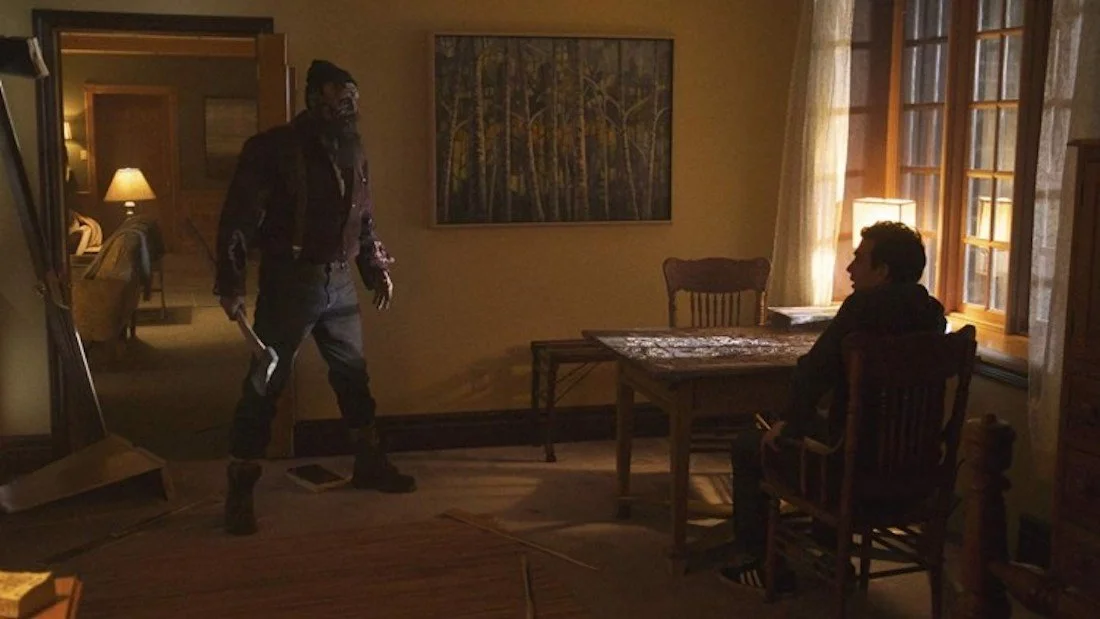Cinematic Acts Of Slasher Deconstruction
The deconstruction of the slasher sub-genre has arguably become just as popular as the sub-genre itself. Movies like SCREAM, TUCKER AND DALE VS. EVIL, THE FINAL GIRLS, and FREAKY act as a balance of sorts to the more traditional slasher style, building off the themes and tropes of slashers to make something both totally different and yet, at the same time, familiar.
Many of these kinds of movies tend to retread the same ground when it comes to the themes and tropes they tackle, which isn’t necessarily a bad thing. When it comes to them, it’s really the personality that matters most. That being said, meta-slashers that feel truly outside of the box are a rare breed that deserve more recognition and respect.
So, for this we’ll be highlighting two such examples, 1981’s JUST BEFORE DAWN and 2019’s RANDOM ACTS OF VIOLENCE, two movies that don’t just flip the script on its head, but suplexs it right through the wrestling mat. You could almost call them anti-slashers. Proceed with caution, there will be spoilers ahead.
JUST BEFORE DAWN starts off with two buddies investigating an abandoned church deep in the mountains of Oregon, only to run into someone there to do the devil’s work. We then cut to an RV full of five college kids, Constance, Warren, Johnathan, Daniel, and Megan, heading the same direction to check out some land Warren inherited. They are stopped by a forest ranger who warns them to turn back, a warning that they completely ignore, and then immediately after meet the one guy who managed to escape the church alive. He warns them of demons which they also ignore. Double harbinger, double trouble.
It really isn’t until the third act hits when bodies start dropping. Johnathan is knocked off a rope bridge, and both Megan and Daniel are killed in the church where we discover the killers are actually a pair of twins. When the forest ranger goes to investigate, he finds the twin’s family and learns that they’re a product of rape and incest and by all accounts evil incarnate because of course they are.
Constance is chased up a tree by one of the twins, but before he can kill her the forest ranger shoots him dead. She and Warren go back to camp to get their things and are attacked by the other twin who stabs Warren. Constance faces off against him in an intense fight ending with her straddling him, shoving half her arm down his throat, and choking him to death while Warren watches because that’s what bad bitches do. The movie ends with Warren sobbing staring at a newly reborn Constance bathed in sunlight with a look of satisfaction on her face.
JUST BEFORE DAWN was released in 1981, right when the basic tropes of the slasher were being established, and yet somehow, like RANDOM ACTS OF VIOLENCE 38 years later, manages to not just function as a deconstruction of slashers, but outright refutes their tropes in ways that are still relevant to this day.
First of all, it’s a slow burn, which in the world of slashers, a sub-genre known for its urgent, gleeful display of guts and gore, is almost sacrilege. Even when you see the killings, they aren’t particularly all the violent. That’s not to say they aren’t effective, it’s more like the kills aren’t the point, except for the last one that is. Like I said, sacrilege.
What really makes JUST BEFORE DAWN special is the way it approaches the final girl trope, primarily in its relation to sexuality. Constance starts off the movie as your typical final girl, conservatively dressed, sexually repressed, and always having to be the responsible one. This is until a scene where her, Megan, and Daniel are left alone at camp in the middle of the night and notice someone stalking them. While Megan and Daniel go into fight mode, Constance freezes, with her moment of perceived powerlessness acting as a catalyst for her growth.
As the movie continues, Constance starts to become more like Megan, someone whose strength and will she admires. She dresses more provocatively, dances like a woman her age instead of a grandma, and overall begins to embrace her desires. By the end, she isn’t the same person anymore. When she faces off against the final killer, it’s like a starved tiger has been let of a cage, like she’s been waiting her entire life to break from her shell and go absolutely bananas. The look in her eyes, the way she moves, and how she kills him all feel sexual in their composition as if to further drive the point home.
Instead of being punished for embracing her sexuality, it’s actually by embracing it and letting go of the person she thought she had to be that has her come out on top, literally. Her entire character and the way she’s reborn rejects the very notion of what a final girl is traditionally supposed to be, especially at the time, and in the process gives us one of the greatest final girls in history.
RANDOM ACTS OF VIOLENCE, directed by Jay Baruchel—you heard me right, Hiccup from the acclaimed children’s animated series HOW TO TRAIN YOUR DRAGON—functions much in the same way, just with different tropes and themes.
We follow Todd, critically acclaimed creator of the hit comic series Slasherman whose protagonist is based off a real serial killer. After running into a case of writers block for the final issue, he, his girlfriend Kathy, publisher Erza, and his assistant Aurora go on a road trip across America for a press tour to get some inspiration. When they get to the same town that Slasherman terrorized two decades prior, they come to the shocking discovery that people have been brutally murdered everywhere they’ve gone, killed eerily in the same way as drawn in Todd’s comic.
One by one Todd’s little group is unceremoniously picked off. Eventually, Todd and Kathy are captured by Slasherman, and it’s revealed that Todd was the child of one of his victims who he let live because he felt admired by a drawing he made of him. While he was writing Slasherman, the real guy no longer felt like he had to kill, because it was, in a way, being done for him. His legacy was living in hands he trusted, but when the series was announced to end and Todd hadn’t found a proper conclusion yet, he decided to give him one. Men will literally do anything other than go to therapy.
Todd returns to his childhood home to find the corpses of his friends and Kathy sitting around a birthday themed table where Slasherman has set things up to look like the day they met. He tells Todd just how much his work has meant to him and to kill him for his perfect ending, which he does. As Todd looks at the result of his poor attempt at managing his trauma, he grieves over a Kathy, and then tips over a birthday candle setting the house ablaze with him inside.
What we have here is a case of a movie that actively wants you to feel bad for watching it. It’s slick and stylish in its approach not to heighten the violence for your enjoyment, but rather to make you feel dirty. It’s a slasher whose whole point is that you are not supposed to enjoy the slashing, something it has in common with JUST BEFORE DAWN. In this way, it’s a lot like the 1974 TEXAS CHAIN SAW MASSACRE and its 2003 remake, both movies that want you to feel drenched in filth by the end credits.
While the kills are works of sadistic genius, they feel shockingly real and never once gratifying. We see Slasherman hype himself up before his slaughters and his victims panic in ways that can only be described as sickeningly human. How characters around Todd react to the killings with almost vitriol towards him and his refusal to take any personal accountability feel genuine rather than contrived for the purpose of getting a message across.
RANDOM ACTS OF VIOLENCE is straight up mean, with its main goal to make you to feel ashamed of yourself for wanting to watch people die, which you very much will. It denies you gratification at every turn and then spits in your face for even wanting some in the first place, leaving you craving a skin scalding shower to wipe off the filth leaking from the screen.
JUST BEFORE DAWN and RANDOM ACTS OF VIOLENCE are two movies that can only be described as kindred spirits, especially considering how dramatically different they are from your usual meta-slasher affair. They’re slashers that, in their own ways, defy what it means to be a slasher and don’t care if you like it or not. If you’re looking for something more obscure this spooky season, consider giving these underrated gems a little more love.





